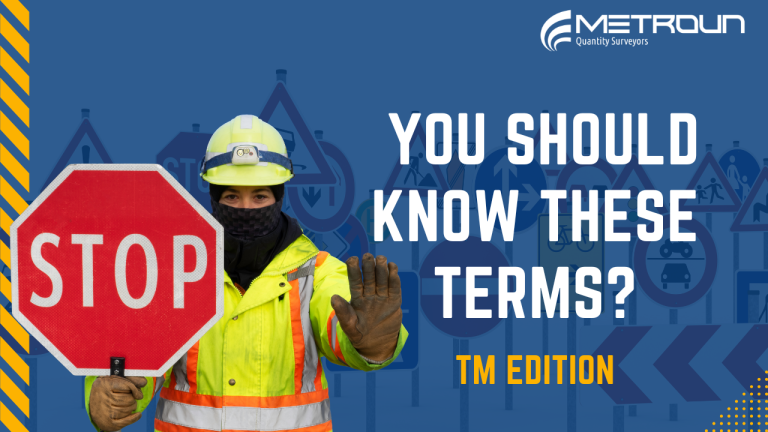Whether you’re working on a major highways project, an urban regeneration scheme, or a small road improvement job, understanding traffic management is vital for a Quantity Surveyor. Good knowledge of common terms helps you communicate clearly with contractors, planners, and local authorities, and makes sure your cost estimates and contract documents are robust.
Here are 15 essential traffic management terms every QS should have in their toolkit:
1. Traffic Management Plan (TMP)
A detailed plan showing how traffic (including pedestrians and cyclists) will be safely managed around a construction site or roadworks area. It includes diversions, signage, barriers, and working hours.
2. Temporary Traffic Regulation Order (TTRO)
A legal order that allows temporary changes to the highway, such as road closures, speed restrictions, or suspension of parking during works.
3. Stop/Go Boards
Manual or automatic boards used to control traffic flow through single-lane works. An alternative to portable traffic lights for short-duration works.
4. Contra-Flow
A system where traffic flows in the opposite direction to normal, typically used to keep traffic moving while one carriageway is closed.
5. Lane Closure
Closing one or more lanes of a road to allow works to proceed safely. QSs need to be aware as closures often attract extra costs and penalties for extended durations.
6. Diversion Route
An alternative route provided for road users when the normal route is closed. Clear signage is required, and diversions can affect traffic flow and project costs.
7. Portable VMS (Variable Message Sign)
Electronic signboards used to provide real-time information to drivers about closures, delays, or diversion routes.
8. Impact Protection Vehicle (IPV)
A specialist vehicle fitted with a rear-mounted crash cushion to shield workers and equipment during mobile or short-duration works on high-speed roads. It absorbs the force of any accidental impact from approaching traffic, protecting crews carrying out tasks like line marking or inspections.
9. Advance Warning Signage
Signs placed ahead of works to inform road users about upcoming restrictions, closures, or diversions.
10. Overnight Possession
Complete closure of a road or railway at night to carry out work that cannot be done safely with traffic passing. Often comes with strict timing and financial penalties for overrun.
11. Traffic Management Operative (TMO)
A trained worker responsible for setting out, maintaining, and removing traffic management equipment safely.
12. Traffic Safety and Control Officer (TSCO)
A supervisor who oversees the setup and ongoing safety of traffic management arrangements, ensuring compliance with legal and safety standards.
13. Rolling Roadblock
A temporary block of traffic flow for a short duration, usually to allow works that cannot be done safely with vehicles passing. Common in resurfacing or line painting.
14. Airlock System
A controlled entry arrangement using gates or barriers that allows only one vehicle or person through at a time, maintaining site security and separation from public traffic. Commonly used on constrained urban sites or secure works to prevent unauthorised access and manage vehicle movements safely.
15. Chapter 8
Refers to the part of the UK’s Traffic Signs Manual that gives detailed guidance on signing and safety measures for temporary situations on roads.
Final Thoughts
Next time you’re pricing a highways scheme or reviewing method statements, keep these traffic management terms in mind. A clear grasp will help you spot missing costs, negotiate variations, and support safe, compliant project delivery.










